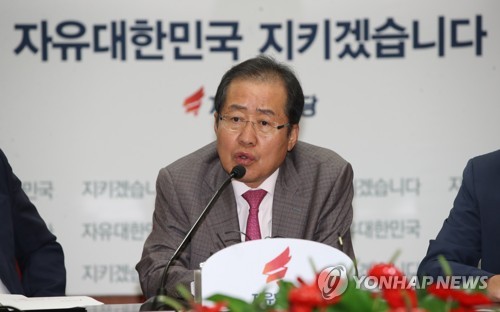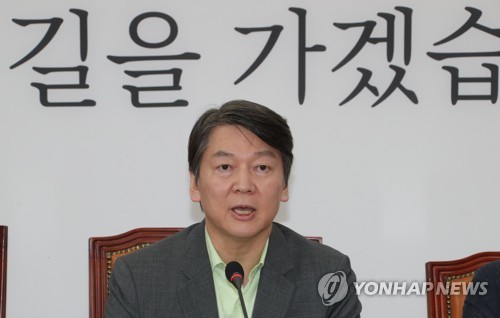Conservative parties on Sunday raised pressure on President Moon Jae-in to rethink his "dovish" approach toward North Korea following its sixth nuclear test, urging him to explore stronger options such as the redeployment of U.S. tactical nuclear arms.
They demanded that the liberal president renounce his pursuit of dialogue with an increasingly belligerent Pyongyang, and craft more realistic, practical measures to deter additional provocations.
Tensions spiked Sunday as the North conducted what it claims to have been a test of a hydrogen bomb mountable on an intercontinental ballistic missile (ICBM) in a stinging blow to Moon's peace initiative that seeks to denuclearize the North through dialogue and sanctions.
"The Moon Jae-in government's responsibility (for the nuclear test) is great as it has sent the wrong signal to the North by sticking to dialogue and disregarding the threat from the regime," Khang Hyo-shang, the spokesman of the main opposition Liberty Korea Party, told reporters.
"The government has to craft strong responses," he added, stressing the need to firm up the South Korea-U.S. security alliance and elevate all armed services' monitoring and vigilance postures.
Khang, in addition, pointed out that the North's latest strategic provocation has crossed the "red line" set by Seoul and Washington. During a press conference last month, Moon defined the red line as Pyongyang weaponizing a nuclear-tipped ICBM.
Hong Joon-pyo, the party leader, discounted Moon's earlier pledge to take the "driver's seat" in security affairs surrounding the Korean Peninsula as an approach that has seen South Koreans being taken as "nuclear hostages."
"I urge the government to promptly renounce its policy of begging for peace and strengthen the alliance with the U.S.," Hong said in a Facebook post.

The security hawk also doubled down on his party's call for the redeployment of U.S. tactical nukes that were withdrawn from Korea in the early 1990s following an inter-Korean declaration for a nuclear-free Korean Peninsula.
He has long stressed the need to seek a "balance of nuclear power" -- or a "balance of terror" -- with the North, an idea the Seoul government has dismissed based on its denuclearization and non-proliferation principles.
The North's continued provocations, including its long-range missile tests in July, have provided political fodder for the conservative bloc to accentuate its professed security forte and sharpen criticism of the liberal camp's penchant for cross-border dialogue.
The minor conservative Bareun Party also demanded a "wholesale revision" to the government's policy towards the North, underscoring the importance of firming up security cooperation with the U.S. and Japan.

"Since the Moon administration was launched (in May), we have stressed our position against an impractical policy based on dialogue," Park Jung-ha, the party's spokesman, told reporters.
"As a result of the policy, we have seen (the North's) nukes and ICBMs," he added.
Meanwhile, Ahn Cheol-soo, the leader of the center-left People's Party, proposed emergency security talks involving the president and the leaders of the ruling and opposition parties, while strongly denouncing the North's nuke test.
"The Moon government should not be stuck in its pursuit of dialogue anymore," Ahn said in a statement.
"The North, which has rejected a path of peace and dialogue and chosen the path of nuclear armament and confrontation, has proved that it is no longer a rational interlocutor," he added. (Yonhap)

